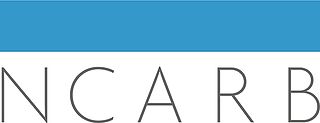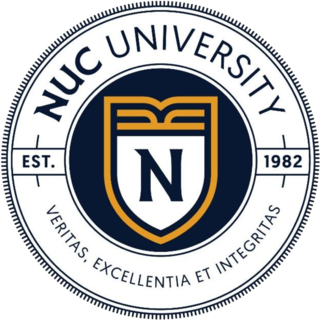
The University of Puerto Rico is the main public university system in the U.S. Commonwealth of Puerto Rico. It is a government-owned corporation with 11 campuses and approximately 44,200 students and approximately 4,450 faculty members. UPR has the largest and most diverse academic offerings in the commonwealth, with 472 academic programs of which 32 lead to a doctorate.
Below are links to lists of institutions of higher education in the United States by state, grouped by Census Region, as well as lists of institutions in United States insular areas and of American institutions located outside the United States and its territories.

The Western Association of Schools and Colleges provided accreditation of public and private universities, colleges, secondary and elementary schools in California and Hawaii, the territories of Guam, American Samoa and Northern Marianas Islands, in addition to the Marshall Islands, Federated States of Micronesia, Palau, the Pacific Rim, Peru, Czech Republic, Armenia, and East Asia.

The University of Puerto Rico, Humacao is a public college in Humacao, Puerto Rico. It is part of the University of Puerto Rico. Its campus is home to the UPRH Astronomical Observatory and the college graduates more majors in chemistry, physics, and mathematics than any other higher education institution on the island. UPRH has been accredited by the Middle States Commission on Higher Education (MSCHE) since 1965.

The Middle States Association of Colleges and Schools, also referred to as Middle States Association or MSA, is a voluntary, peer-based, Philadelphia-based non-profit association that performs peer evaluation and regional accreditation of public and private schools in the Mid-Atlantic United States and certain foreign institutions of American origin.
Capitol Technology University is a private university in South Laurel, Maryland, near Washington, DC. The university was founded in 1927 as the Capitol Radio Engineering Institute by a former US Navy Radioman. CREI changed its name to Capitol Institute of Technology in 1964, changed its name again to Capitol College in 1987, and assumed its present name in 2014. Capitol offers undergraduate and graduate programs specializing in engineering, computer science, information technology, and business. It is classified among "Special Focus Institutions—Schools of Engineering" and is a National Center of Academic Excellence in Information Assurance Education.
Alliance University was a private Christian university affiliated with the Christian and Missionary Alliance. Located in New York, New York, the university offered undergraduate and graduate programs; in addition, it included Alliance Theological Seminary.
These are lists of school districts in the United States

The Northwest Commission on Colleges and Universities (NWCCU) is an independent, non-profit membership organization recognized by the United States Department of Education since 1952 as an institutional accreditor for colleges and universities.

The King's College is a private non-denominational Christian liberal arts college in New York City.

The Council for Higher Education Accreditation (CHEA) is a United States organization of degree-granting colleges and universities. It identifies its purpose as providing national advocacy for academic quality through accreditation in order to certify the quality of higher education accrediting organizations, including regional, faith-based, private, career, and programmatic accrediting organizations.

The National Council of Architectural Registration Boards (NCARB) is a nonprofit corporation comprising the legally constituted architectural registration boards of the 50 states, the District of Columbia, Guam, the Northern Mariana Islands, Puerto Rico, and the U.S. Virgin Islands as its members. Its mission is to collaborate with licensing boards to facilitate the licensure and credentialing of architects to protect the health, safety, and welfare of the public.
The Association of Public and Land-grant Universities (APLU) is a research, policy, and advocacy organization of public research universities, land-grant institutions, state university systems, and higher education organizations. It has member campuses in all of the United States as well as the District of Columbia, four U.S. territories, Canada, and Mexico.

In the United States, the forest cover by state and territory is estimated from tree-attributes using the basic statistics reported by the Forest Inventory and Analysis (FIA) program of the Forest Service. Tree volumes and weights are not directly measured in the field, but computed from other variables that can be measured.
Higher education accreditation in the United States is a peer review process by which the validity of degrees and credits awarded by higher education institutions is assured. It is coordinated by accreditation commissions made up of member institutions. It was first undertaken in the late 19th century by cooperating educational institutions, on a regional basis.
Educational accreditation is a quality assurance process under which services and operations of educational institutions or programs are evaluated and verified by an external body to determine whether applicable and recognized standards are met. If standards are met, accredited status is granted by the appropriate agency.

ASA College was a private for-profit college in New York City and Hialeah, Florida. The college had three campuses: Midtown Manhattan and Downtown Brooklyn in New York, and Hialeah in Florida. It offered associate degrees, bachelor's degrees, and professional certificates in the divisions of business administration, health disciplines, legal studies, and computer technology. Although it was accredited by the Middle States Commission on Higher Education, that accreditation was removed in 2023 as the college failed to meet several of the commission's standards. The institution closed on March 1, 2023.

NUC University, is the largest for-profit private university in Puerto Rico with its main campus in Bayamón, Puerto Rico. The university was founded in 1982 as the National College, and offers undergraduate studies and graduate studies in health, business administration, education, information technology, and criminal justice.
The New England Commission of Higher Education (NECHE) is a voluntary, peer-based, non-profit membership organization that performs peer evaluation and accreditation of public and private universities and colleges in the United States and other countries. Until federal regulations changed on July 1, 2020, it was one of the seven regional accreditation organizations dating back 130 years. NECHE then became an institutional accreditor recognized by the United States Department of Education and the Council for Higher Education Accreditation.












